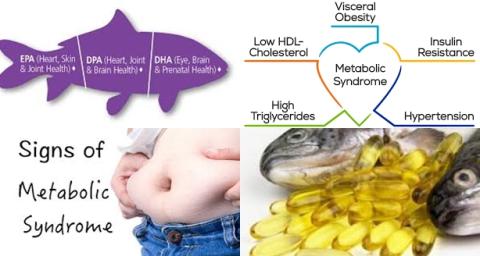
Objectives:
The associations between n-3 polyunsaturated fatty acids (PUFAs) and metabolic syndrome (MetS) risk have demonstrated inconsistent results. Therefore, this review article (meta-analysis) has been conducted.
Do higher circulating n-3 PUFA levels associate with a lower metabolic syndrome risk?
Study design:
This review article included a total of 7 case-control studies and 20 cross-sectional studies.
There was no publication bias.
Results and conclusions:
The investigators found a higher plasma/serum n-3 PUFAs was associated with a lower metabolic syndrome risk of 37% [pooled OR = 0.63, 95% CI = 0.49-0.81, I2 = 72.4%].
The investigators found the plasma/serum n-3 PUFAs in controls was significantly higher than cases [WMD = 0.24, 95% CI = 0.04-0.43], especially docosapentaenoic acid (DPA) and docosahexaenoic acid (DHA).
The investigators found, however, no significant association between dietary intake of n-3 PUFAs or fish and metabolic syndrome risk.
The investigators found in sensitivity analysis by omitting one study at a time and re-calculated the remaining data, that exclusion of anyone study did not substantially influence the pooled effects.
The investigators concluded a higher circulating n-3 PUFAs is associated with a lower metabolic syndrome risk. The circulating n-3 PUFAs can be regarded as biomarkers indicating metabolic syndrome risk, especially DPA and DHA. The evidence of this review article will have important public implications in preventing metabolic syndrome through supplemental long-chain n-3 PUFAs of marine-origin. Furthermore, added RCTs and epidemiological studies with large sample-size are warranted to confirm these findings.
Original title:
n-3 Polyunsaturated Fatty Acids and Metabolic Syndrome Risk: A Meta-Analysis by Guo XF, Li X, […], Li D.
Link:
https://www.ncbi.nlm.nih.gov/pmc/articles/PMC5537818/
Additional information of El Mondo:
Find more information/studies on overweight and n-3 PUFA right here.
Docosapentaenoic acid (DPA) is a dietary omega-3 fatty acid mainly found in fish, fish oil, seal oil and red meat.
Find out whether you are overweight or not right here.